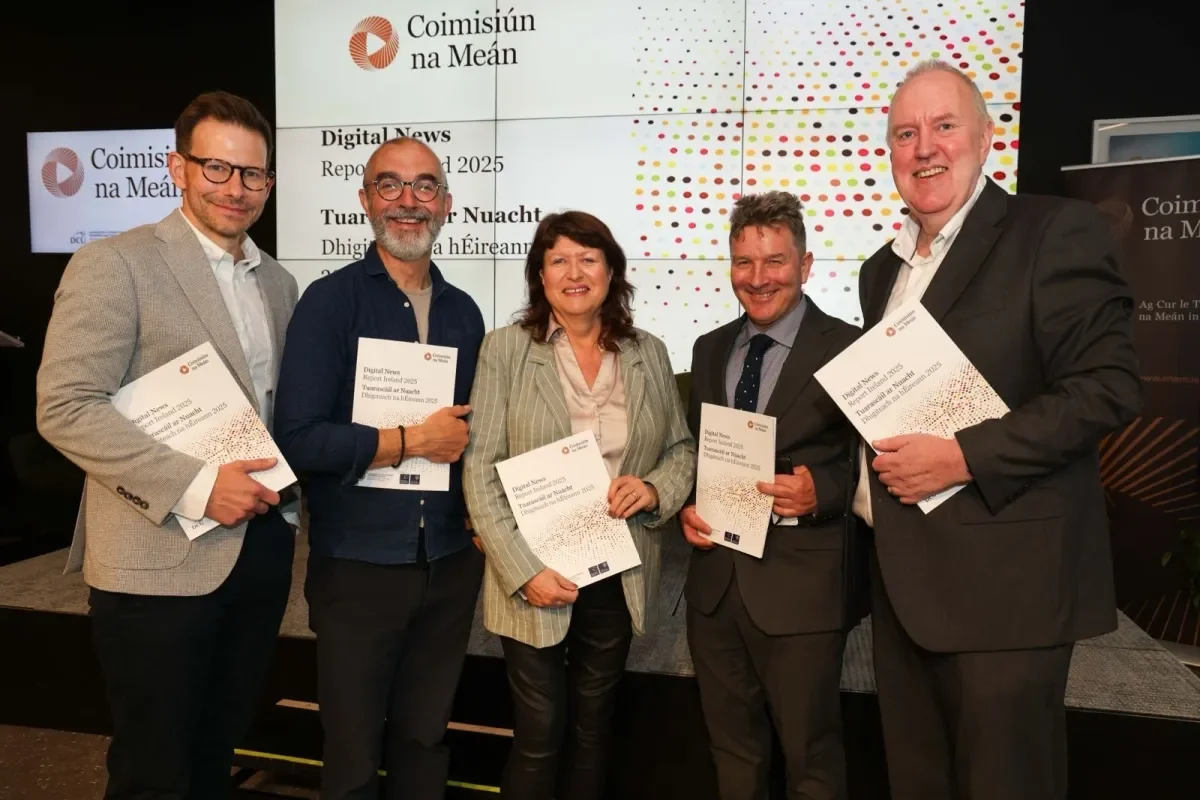

Local news sources among the most trusted - Digital News Report
A majority of Irish people are either extremely or very interested in news, according to the annual Digital News Report Ireland 2025, published today by Coimisiún na Meán.
The Irish Report, which is in its eleventh year, shows that most people in Ireland (56%) across all age groups are interested in news. This represents the highest level of interest in news since 2022, up 3 points from last year, but down from a peak of 70% in 2021, during the Covid pandemic. This enthusiasm for news puts Irish audiences ahead of their UK (39%) and US (51%) counterparts and ahead of the European average (45%).
When asked about trusted sources of news, RTÉ News (72%), local radio news (72%) and local newspapers (71%) emerge as the most trusted brands, underlining the continued importance of both national and local news sources for Irish audiences.
Key findings from this year’s Report include:
Interest in news – Interest in news in Ireland remains robust compared to other countries. 22% of Irish people say they are ‘extremely interested’ in news, with 34% saying they are ‘very interested’ and 33% saying they are ‘somewhat interested’. Just 3% say they are ‘not at all interested’ in news.
Trust in brands – Traditional news outlets continue to perform well when Irish audiences are asked about their trust in brands. RTÉ News (72%), local or regional radio (72%), and local or regional newspapers (71%) are the most trusted brands. 70% of Irish respondents described the Irish Times as trustworthy, with the same percentage for BBC News, 68% for the Irish Independent and 66% for each of Newstalk, Today FM and Sky News.
Source of News – When asked which platforms you have used in the last week as a source of news, 58% of Irish respondents said television, with the same percentage (58%) citing online media (excluding social media and blogs). 47% say they have used social media as a source of news in the last week, with 36% saying radio, 22% saying printed newspapers, 12% saying podcasts and 5% citing AI chatbots.
Paying for News – The Report shows that 20% of people in Ireland are now paying for news, up from 7% in 2015 and a 3-point increase from last year. When asked if they have had a paid subscription/membership to a digital news service in the last year, the two frontrunners among Irish audiences are the Irish Independent (36%) and the Irish Times (33%).
Radio and Podcasts – In 2025, 11% of Irish respondents say they use radio as their primary source of news, which is significantly higher compared to the UK (8%), US (3%) or the European average (7%). When asked about the use of radio as a source of any news consumed, this figure increases to 36%. Irish audiences are also on-board with podcasts, with 12% listening to podcasts as a source of news in the last week, higher than in the UK (7%) and the European average (9%) but lower than the US (15%).
Artificial Intelligence – Audiences' attitudes to the use of AI for news are changing. Last year, those ‘very’ and ‘somewhat’ comfortable with news mainly produced by AI with some human oversight were 15%. This has increased to 19% this year, with under-35s almost twice as comfortable as over-35s when considering the same measure.
Disinformation and Misinformation – When asked for their thoughts about online news, 68% of Irish respondents say they are concerned about what is real and what is fake on online. All age cohorts show concern about fake information online, with the highest rate (72%) among those aged 65+ and the lowest rate (62%) among those aged 18-24.
Commenting on the Digital News Report Ireland 2025, Dr. Eileen Culloty, Deputy Director of the DCU Institute for Future Media, Democracy and Society (FuJo) said:
"Local media enjoy strong public trust, an indication of their deep roots in Irish life. But trust alone doesn’t pay salaries or sustain newsrooms. The big challenge is to convert trust into viable careers in local journalism so that local media can continue informing communities."
Earlier this year, Coimisiún na Meán awarded €5.7 million through new Journalism Schemes, funded by the Department of Arts, Culture, Communications, Media and Sport and which covered Local Democracy and Courts Reporting. These Schemes have to date facilitated over 100 new or enhanced journalism roles in Ireland. By the end of this year, An Coimisiún will have run the second round of those Schemes, as well as two new Journalism Schemes, covering Digital Transformation and News Reporting.

Rónán Ó Domhnaill, Media Development Commissioner at Coimisiún na Meán said:
"Coimisiún na Meán is delighted to offer our continued support to the Digital News Report Ireland, which reflects our commitment to a media landscape that consumers can trust, by supporting access to high-quality sources of news and information. Whether watching, listening, streaming, or reading, the Digital News Report shows that most Irish people can’t get enough of news. It is encouraging to see that interest in news remains high in Ireland when compared internationally, even as the formats used to consume news continue to change. We are heartened to see the continuing trend of the Irish public’s unique and longstanding relationship with radio, which remains a cornerstone of Ireland’s media landscape. It is also important to see the trust Irish people place in local news sources, with local radio and local newspapers among the most trusted brands for Irish audiences.
"While the Report gives us cause for optimism about the Irish news sector, considering the public’s strong appetite for news, we recognise that An Coimisiún’s ambition of developing and shaping a media landscape that reflects who we are as a society requires ongoing and sustainable levels of funding for media outlets to support high-quality journalism, and news that people can trust."
